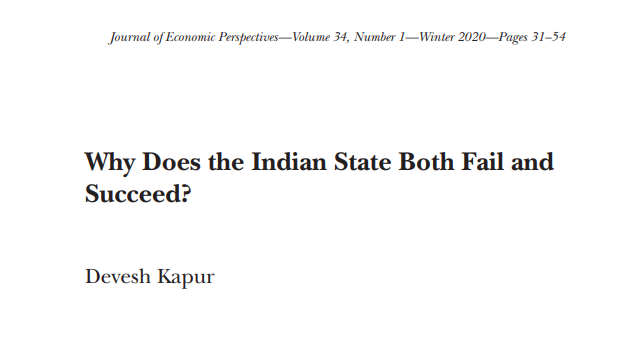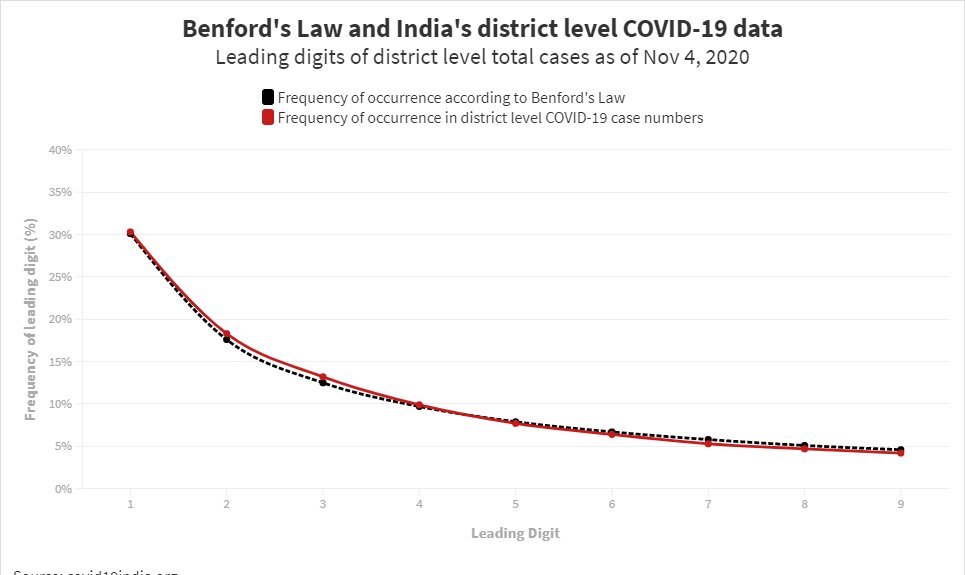
#YearinReview Here is our list of 5 of the most interesting papers on state capacity this year!
Devesh Kapur's 'Why Does the Indian State Both Fail and
Succeed?' seeks to explain why India tends to have a better record on specific tasks like eradicating polio—where delivery is episodic with inbuilt exit—than on things like improving public health outcomes more generally.
Succeed?' seeks to explain why India tends to have a better record on specific tasks like eradicating polio—where delivery is episodic with inbuilt exit—than on things like improving public health outcomes more generally.

Kapur proposes some explanations: understaffing of local governments, ramifications of India adopting democracy at a 'precocious' stage relative to its economic development, and the persistence of social cleavages in India by caste, gender, and religion.
pubs.aeaweb.org/doi/pdf/10.125…
pubs.aeaweb.org/doi/pdf/10.125…
Significantly, he argues against claims that the state sector is bloated in size and submerged in patronage, showing instead that the Indian state is, by the number of personnel, relatively small in comparative context and that recruitment to government jobs is fairly rule based.
A paper by Jozefina Kalaj, Daniel Rogger, and Ravi Somani on bureaucratic time-use and productivity, based on a survey experiment with Ethiopian civil servants, is a rare deep-dive into a key organisational consideration for strengthening state capacity. 

Interestingly, they find that the largest difference from the private sector is that senior bureaucrats spend less time in meetings and more time working alone. However, time working alone mitigates the positive impacts of performance incentives on service delivery.
It also negatively impacts any positive effects of autonomy. Investments in coordination in the public administration, therefore, are substantial predictors of service quality.
danrogger.com/files/papers/K…
danrogger.com/files/papers/K…
In 'The Political Economy of Bureaucratic Overload', @_adasgupta and Devesh Kapur also draw on time-usage diaries of rural BDOs—alongside focus group discussions and a questionnaire about local resources—in an effort to understand poor implementation of govt. programmes in India. 

They argue that electoral incentives are such that politicians see little reason to invest in local bureaucracy, while also announcing ambitious new programmes—the implementation of which is delegated to that same local bureaucracy—causing what they call 'bureaucratic overload'.
Local bureaucrats are heavily under-resourced relative to their responsibilities. BDOs often find themselves 'fire-fighting', unable to spend time focusing on the overall coordination of programmes—which is ultimately damaging for state performance.
econpapers.repec.org/article/cupaps…
econpapers.repec.org/article/cupaps…
In their paper in the Review of Economic Studies, Marianne Bertrand, Robin Burgess, Arunish Chawla, and @guoxu_econ suggest, based on evidence from the IAS, that the career incentive of reaching the top of a public organization is a powerful determinant of bureaucrat performance. 

They provide evidence that older entering officers who cannot—due to the fact that promotion is constrained by seniority—reach senior-most positions are more likely to be suspended. But extending the retirement age may motivate them to exert more effort.
restud.com/wp-content/upl…
restud.com/wp-content/upl…
In 'Hunger, COVID-19 and the Indian Administrative State', @CPR_India's Arkaja Singh focuses on what Indian state governments did to respond to the needs of migrant workers and others outside the reach of the organised, but rigid Public Distribution System. 

States struggled to identify beneficiaries, and did not necessarily have the organisational wherewithal to take up rapid, decentralised and locally grounded interventions—given that the state is risk-averse and disinclined to allow for any discretion in spending of govt. funds.
Singh argues that what is fundamentally needed to improve responsiveness is for high levels of government to be able to trust in the ability of their subordinate ranks to carry out new interventions, often in case-specific and individualised ways.
cprindia.org/research/paper…
cprindia.org/research/paper…
• • •
Missing some Tweet in this thread? You can try to
force a refresh





